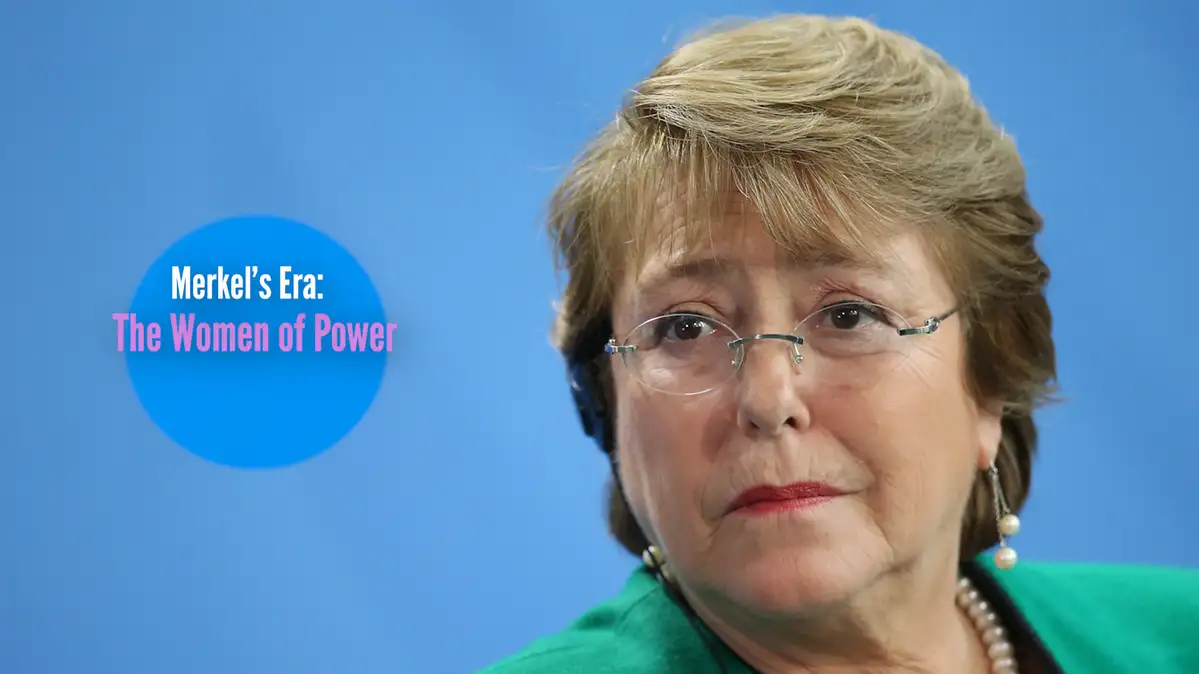Becoming: Michelle Bachelet

You are a woman of power with a lot of experience in political leadership. Where does your passion for politics come from?
Well, I think probably from my family. They were not politicians but there was this conviction that human beings were all people who deserve the best. I was raised in a home where values and principles of solidarity, collectiveness and the need for everyone to have access to all their rights were important—that was something I learned from a very young age. But also then, I realized that the way to change the world had to be through politics because that’s the way to address the structural root causes of those, if I may say, social, economic diseases.
And do you have a female role model, someone who inspired you as a young woman?
I did have one essential role model—my mother who always worked. She always told me, “you can do whatever you want in life, if you commit, if you don’t give up—but it won’t be easy for women.”
You lived through a dictatorship and became not only a witness, but also a victim of it. How did this experience shape your path into politics?
It made me able to play a role that I could only have imagined before, like being a minister of defense of armed forces who were in power in a dictatorship. I mean, my father died because of torture. We were in prison and many of the people who were imprisoned disappeared. So it strengthened my concept of human rights, the value of democracy and dialogue.
You became the first female minister of defense in Latin America and four years later, the first female president in Chile. It was a turning point, not only in your life, but also in your country’s history. Which obstacles did you as a woman have to overcome on your way to the top?
I was the first [defense minister] in Chile, in Latin America and the fifth in the history of the world. But I’m not saying this to show how proud I am, but rather how terrible the situation for women is. One of the ways to overcome the obstacles was through dialogue. The content, the substance, but also the tone of how you deal with things is important.
For many people these two words—women and power—still don’t go together. How did you deal with this bias?
I worked in the ministry of health and that was not a big challenge. But then coming to a ministry where there hadn’t been a female minister, the challenge was gaining respect. But of course, as I have studied those issues, they saw that I knew what I was talking about and that I can make good decisions.
For some women it has been very difficult to lead in their own way and not to try to lead like a man. I had a friend who was a trade unionist in the health sector and she said to me that if I don’t swear or say dirtywords in meetings, then people won’t respect me. And I said, oh no, over my dead body, I will be as I am.
Unlike men with children, it’s still difficult for women to juggle both childcare and career for them to get to the top. What has to change?
We need to show good stories of very powerful and successful women. And I’m not talking about power in terms of power by itself, but rather to show that women can be very important. People need to see that women can succeed and not only in the political arena, but also as entrepreneurs or in other areas. This gives hope to people.
We also need to change the culture. I always use the following argument because Chile is a country that loves football. And I would say always, can you imagine winning one of these huge championships with only half of the team? Impossible.
You need to consider arguments that can destroy stereotypes and work on eliminating stereotypes that are prejudicial not only for women, but also for men. A society where everyone has the same opportunities and rights is a happier society.
Here in Germany, Chancellor Angela Merkel is the first woman to serve in her office, just as you were in Chile. When you met her, did you feel that you have a lot in common?
We had a very interesting conversation. We Latin Americans can be different from Germans, but I have lived in Germany, so I know it well.
And, of course, you always try to support other female leaders because I think all female leaders need support. Merkel has made really important achievements because, first of all, being the first female federal chancellor is in itself a huge achievement as it shows the German population and the world how important this is. She’s also a very good role model and motivation for other women to get involved either in politics, the economy or other areas.
Are you a feminist?
I do consider myself a feminist. I believe that we need to be feminists because that’s the way to support women’s rights. We need to know that women are not in this situation because of a coincidence. There is a patriarchal system that produces those cultural values. If we do not understand that, we might not be able to tackle and address the root causes of fascism and sexism.
This interview was conducted as part of the series “Merkel’s Era: Women of power.” It has been edited and condensed for clarity.
This article is part of the 2021 English issue of the DW corporate magazine Weltzeit. Read the full magazine here: Weltzeit: Local insight, global reach. Working in a strong network with partners.
